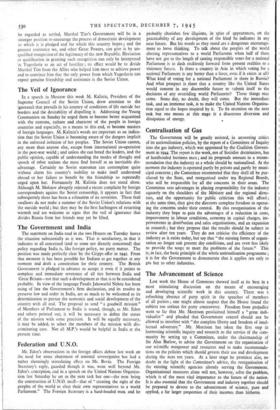The Veil of Ignorance
In a speech in Moscow this week M. Kalinin, President of the Supreme Council of the Soviet Union, drew attention to the ignorance that prevails in his country of conditions of life outside her borders and the desirability of dispelling it. Addressing the Young Communists on Sunday he urged them to become better acquainted with the customs, culture and character of the people in foreign countries and especially, as a means to this end, to become masters of foreign languages. M. Kalinin's words are important as an indica- tion that the Soviet Union is becoming aware of the dangers implicit in the enforced isolation of her peoples. The Soviet Union cannot, any more than anyone else, escape from international co-operation in the post-war world ; and unless she can breed the leaders, and the public opinion, capable of understanding the modes of thought and speech of other nations she must find herself at an inevitable dis- advantage. Certainly no Soviet statesnlan can contemplate quite without alarm his country's inability to make itself understood abroad or her failure to benefit by the friendship so repeatedly urged upon her. Fortunately M. Kalinin does not stand alone. Although M. Molotov abruptly rejected a recent complaint by foreign correspondents against the Soviet censorship, it appears in fact that subsequently there has been a relaxation of its severities. These frail swallows do not make a summer of the Soviet Union's relations with the outside world ; but they may be the first harbingers of returning warmth and are welcome as signs that the veil of ignorance that divides Russia from her friends may yet be lifted.






























 Previous page
Previous page